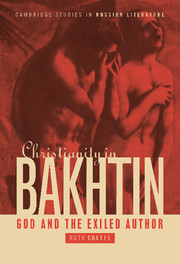Book contents
- Frontmatter
- Contents
- Acknowledgements
- List of abbreviations
- Note on translation and citation
- Chapter 1 Introduction
- Chapter 2 Fall and Incarnation in ‘Towards a Philosophy of the Act’
- Chapter 3 The aesthetic gospel of ‘Author and Hero in Aesthetic Activity’
- Chapter 4 Was Bakhtin a Marxist?: The work of the Bakhtin Circle, 1924–1929
- Chapter 5 Falling silent: the critical aesthetic of Problems of Dostoevsky's Creative Work
- Chapter 6 The exiled author: ‘Discourse in the Novel’ and beyond
- Chapter 7 Christian motifs in Bakhtin's carnival writings
- Chapter 8 The fate of Christian motifs in Bakhtin's work
- Notes
- Bibliography
- Index
- CAMBRIDGE STUDIES IN RUSSIAN LITERATURE
Chapter 3 - The aesthetic gospel of ‘Author and Hero in Aesthetic Activity’
Published online by Cambridge University Press: 22 September 2009
- Frontmatter
- Contents
- Acknowledgements
- List of abbreviations
- Note on translation and citation
- Chapter 1 Introduction
- Chapter 2 Fall and Incarnation in ‘Towards a Philosophy of the Act’
- Chapter 3 The aesthetic gospel of ‘Author and Hero in Aesthetic Activity’
- Chapter 4 Was Bakhtin a Marxist?: The work of the Bakhtin Circle, 1924–1929
- Chapter 5 Falling silent: the critical aesthetic of Problems of Dostoevsky's Creative Work
- Chapter 6 The exiled author: ‘Discourse in the Novel’ and beyond
- Chapter 7 Christian motifs in Bakhtin's carnival writings
- Chapter 8 The fate of Christian motifs in Bakhtin's work
- Notes
- Bibliography
- Index
- CAMBRIDGE STUDIES IN RUSSIAN LITERATURE
Summary
My aim in this chapter is to draw out the Christian dimension to Bakhtin's early text ‘Author and Hero in Aesthetic Activity’. In the first section of the chapter I discuss briefly the critical reception of ‘Author and Hero’ in Russia and the West. I then go on in further sections to offer a reading of the essay in which I have opted to reverse the situation found in the work itself, where Christian motifs and theological concepts form a kind of subtext to the larger sweep of the argument as a treatise on aesthetics, and to arrange the aesthetic material under a theological framework. It is because ‘Author and Hero’ primarily deals with questions of aesthetics that to disregard the theological undertones of the essay is not completely to destroy its significance, although, as I hope to show, such a disregard must impoverish any interpretation. My intention in foregrounding its Christian motifs is not to imply that ‘Author and Hero’ is really a work all about Christianity, but rather to bring order to its scattered religious references so as to bring out the hidden principles of organisation of Bakhtin's aesthetics which I believe they represent. In the last section of the chapter I address what seems to me to be the most striking question arising out of the divine model for aesthetic creativity outlined by Bakhtin, namely the issue of authority, with a view to penetrating to the deepest core of his conception.
- Type
- Chapter
- Information
- Christianity in BakhtinGod and the Exiled Author, pp. 37 - 56Publisher: Cambridge University PressPrint publication year: 1999



